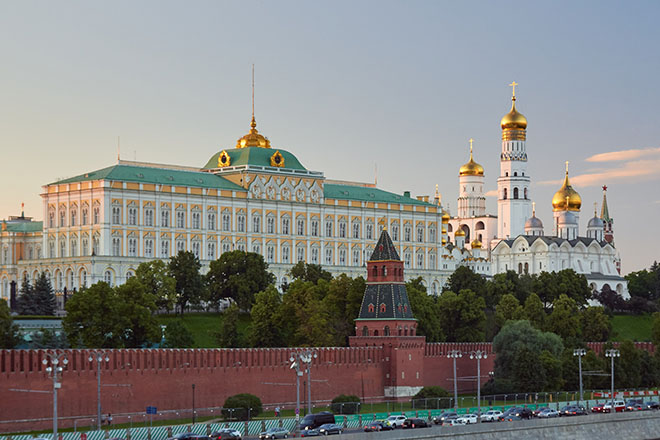
| The U.S. targeted Russian imports in revoking the country's market economy status. Pictured above is the Kremlin fortress in Moscow. Source: Max Ryazanov via Getty Images |
In revoking Russia's market economy status, the U.S. avoided harsher trade measures to limit economic damage and keep further action in reserve as a means of pressuring Russian President Vladimir Putin to end the war in Ukraine, experts said.
The move announced Nov. 10 by the U.S. Commerce Department came after reports the Biden administration was considering an outright ban on aluminum imports from Russia, which accounted for about 5% of U.S. aluminum imports in recent quarters. Aluminum is widely used as wire, pipe, foil and in containers, among other things.
Without market economy status, the U.S. will more closely scrutinize Russia for market distortions and, in turn, levy more severe duties against the country, especially under antidumping rules. And while tougher trade policies could still be in the works, experts told S&P Global Commodity Insights that the U.S. decision to strip Russia of its market economy status amounts to much softer punishment than some of the alternatives reportedly under consideration, such as banning imports from UC Rusal IPJSC, a major Russian aluminum producer.
"Biden probably has calculated that, given concerns for a recession, and given our current inflationary moment, that he's not going to credibly be able to threaten to terminate all trade in aluminum and punish Rusal that way," said Marc Busch, an international trade professor at Georgetown University who has advised the U.S. on trade barriers.
The U.S. Commerce Department could not be reached for comment. In a Nov. 10 statement, the department said it found "extensive government involvement" in Russia's economy that distorts prices and unfairly benefits Russian companies exporting to the U.S.
Trading demotion
Losing market economy status opens the door for the U.S. to levy harsher antidumping duties against Russia if it receives an antidumping complaint, industry veterans said. In the case of aluminum, Russia's demotion means the U.S. would depend less on Russian industry data justifying its production costs and more on those of proxy countries. This could boost antidumping duties, making Russian imports more expensive.
The move also telegraphs to markets and Russia that the U.S. is holding back on harsher measures, at least for now.
"I see it as a signal that there are many additional steps that can be added to this," said Jean Simard, president and CEO of the Aluminum Association of Canada, who closely observes global markets.
From this perspective, the U.S. may be reserving tougher trade measures for a later date, as the U.S. and other countries look for ways to hobble the Russian economy and increase the cost of Putin's war in Ukraine.

The U.S. and many other countries have already targeted Russia with a slew of sanctions since the invasion began, though most have hit the country's financial and energy sectors and not its metal industries. Earlier this year, Russia also lost its most-favored-nation trading status with countries such as the U.S., adding to costs of some Russian exports.
If the U.S. pursued stiffer antidumping measures against Russia, analysts expect the move would boost premiums on U.S. prices for aluminum.
Collateral damage
Economic self interest may have also played a role in the U.S. revoking Russia's market economy status instead of choosing harsher measures. Further sanctions or a full ban could upset global supply chains and raise costs for U.S. manufacturing, potentially doing more damage to U.S companies than Russian ones amid fears of recession, Busch said.
"What I'm sure [the Biden administration is] looking for is Plan B. And Plan B is as much political theater, as it is concrete moves against Russia," said Busch, who expects antidumping duties on Russian aluminum to rise.
Meanwhile, some experts doubt the U.S. will use new antidumping ammunition to target imports of Russian metals for which there are few substitutes, such as palladium. Jeffrey Christian, managing director of advisory CPM Group, said in an email that he does not expect the U.S. to levy "any restrictions" on palladium imports.
Palladium is a key ingredient in catalytic converters, which remove pollution from vehicle exhaust. Russia accounted for about 43.3% of global palladium output in 2020, according to Commodity Insights data, making it difficult for many automakers to get palladium from non-Russian sources.
S&P Global Commodity Insights produces content for distribution on S&P Capital IQ Pro.



